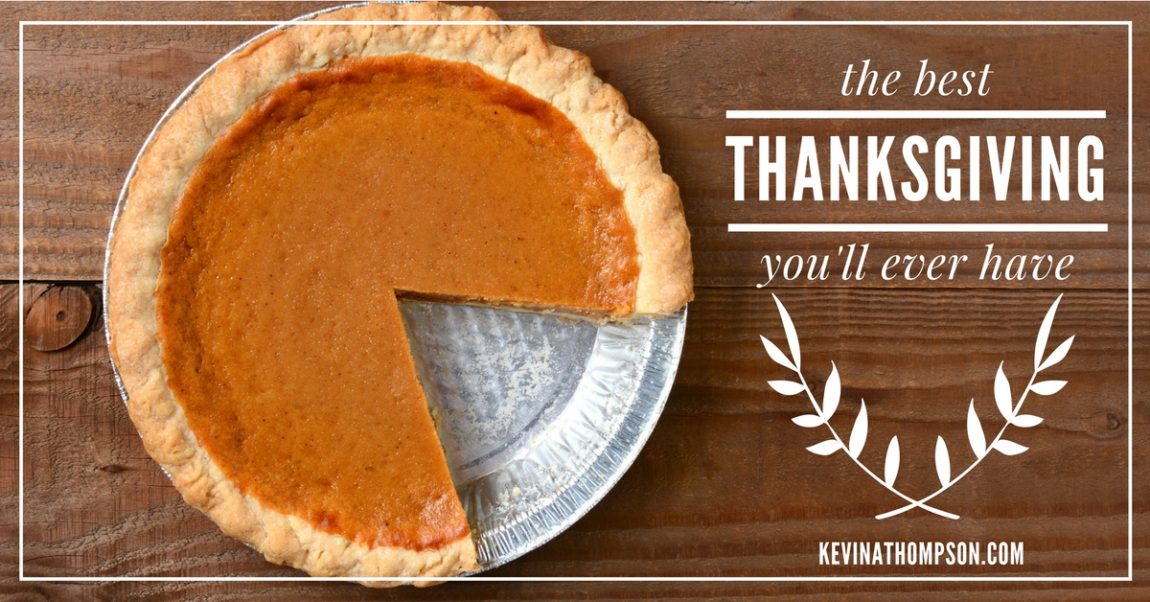I have some friends who will experience their greatest Thanksgiving ever this year. Never will the day have been so sweet, their gratitude been so genuine, or their joy been so full. Some won’t even recognize the goodness of the day until weeks later as they reflect on where they are now compared to where they have been. Others will be keenly aware of what is happening with every passing second of the day. But all of these friends will have the best Thanksgiving of their lives.
What’s their secret?
Freedom. They will feel a depth of gratitude they’ve never had before because they will feel free. Released from the expectations of others, freed from the guilt, and unburdened by shame, they will be able experience a deep appreciation for others, themselves, the blessings in their lives, and the good which is all around them. (See: Can You Tell Your Spouse the Truth?)
Others will have a radically different experience. Shackled by the expectations of others, guilt over past mistakes, or trying to live up to a false-perception of success, they will pretend to be grateful while dealing with a mixture of entitlement and fear. They will be afraid of being found out as a fraud while feeling they deserve so much more. Even if their words are gracious, their hearts will be hardened and Thanksgiving will be yet another day of enslavement.
There is a simple difference between those who experience true gratitude and those who fake it on Thanksgiving day.
It’s not having one’s life perfectly together or having everything you want. It’s not having perfect relationships or careers that are advancing. It’s not a matter of being debt-free or wealthy.
In many ways, the outward circumstances of those who are grateful compared to those who aren’t are very similar. Freedom has little to do with income, job status, relationships, or status symbols.
The difference between the two is truth.
The best Thanksgiving you’ll ever have is the one in which you give genuine thanks based on truth. Not a lie. Not pretending to be thankful when you aren’t. Not putting on a show for other people. When you face the truth of who you are, what has happened in your life, the good and bad of every aspect of life, and begin to live out the truth…Thanksgiving will never be better.
Truth is something most of us run from. We don’t want to know who we truly are–faults and all. We don’t want to have an honest conversation with others. We don’t want to deal with our problems, struggles, and selfishness. So we lie. We lie to ourselves. We lie to others. We base our lives on lies.
While we believe the lies will lead to freedom, they don’t. They enslave us.
We believe the lie that money can lead to freedom so we exhaust ourselves trying to make more money and end up on an endless treadmill of chasing more money while never experiencing freedom.
We convince ourselves that our poor choices aren’t negatively impacting our lives or the lives of others and we become shackled by our bad decisions.
We tell ourselves to cover our faults and not admit our flaws out of fear that others won’t love us if they see who we actually are and we become enslaved by the facade we have created.
Lies may lead to temporary moments of freedom, but in the long term they constrict us. “Oh what a tangled web we weave…” the poet warns. While lies bind us, the truth liberates us. As we experience God’s truth, embrace it, and begin to live by it, the chains begin to fall off. We are no longer bound by our failures, embarrassed by our mistakes, restricted by the expectations of others, or chained by our addictions. (See: ThanksLiving–How to Live a Life of Thanks in an Ungrateful World)
As we live by God’s truth, we are freed. Freedom leads to thanksgiving. To the extent that we feel enslaved, we are likely not living in truth.
The truth of:
who God is and what He has done.
who we are—inconsistent, flawed, and in need, but also loved, forgiven, and in the process of transformation.
who others are—the importance of community and relationships as well as the frustrations and pain of loving others.
the realities of this world—its beauty and its brokenness.
God’s truth leads to freedom and freedom leads to thanksgiving. It forces us to recognize the sorrows of life, but it puts them into a bigger context of God’s love and forgiveness. It allows us to appreciate people even in this midst of their faults. It gives us a gratitude toward the love which God has shown us and the patience he continually shows.
God’s truth brings freedom and freedom produces gratitude. To the extent that you experience freedom, you will feel grateful. But when freedom is not experienced, neither is gratefulness.
This could be your greatest thanksgiving ever, but it will only be so if you are willing to live in God’s truth.



